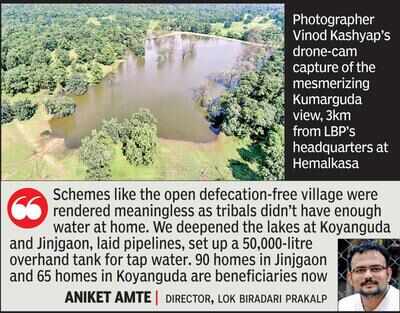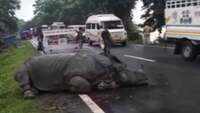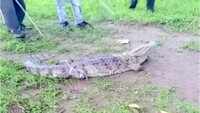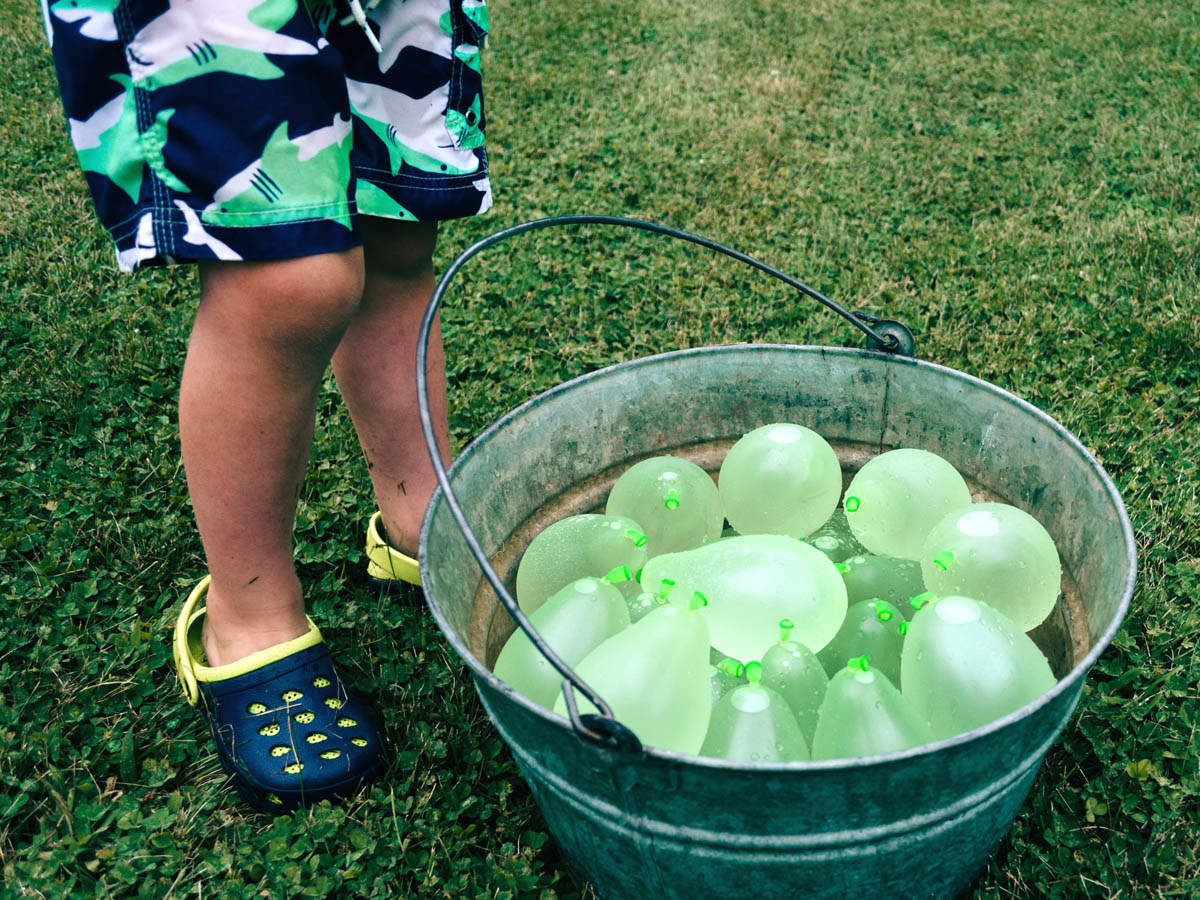
Nagpur: An aerial view of Kumarguda throws up a picture perfect sustainable village development. A flourishing avian presence circling over a placid lake, greenery all around and neat rows of village homes a couple of kms away from the water body. Just like the birds hovering over the lake, the hamlet’s development revolves around the lake.
Kumarguda is among 21 villages in Bhamaragad and one in Aheri tehsil of the Naxal-hit Gadichiroli where the famous Lok Biradari Prakalp (LBP) has successfully implemented the ‘Village Development Programme’. The initiative has put an end to the daily struggle of Madia Gond tribes for water, predominant since the Independence days.
Carrying forward the legacy of the father-son duo of Baba Amte and Prakash Amte to serve tribals, the third generation is working to make the tribal belt self-reliant through development projects.
Known for providing health care and educating tribals in Gadchiroli district beside running a wild animal shelter at Hemalkasa, LBP, led by Prakash Amte’s younger son Aniket, is now spearheading the development of villages since 2016.
The project has also provided tapped water connections in two villages. In all the 22 villages, water is available for irrigation and fisheries in the other 20 round the year. “These villages are also open defecation free,” said Aniket, whose photographer friend Vinod Kashyap captured through drone-cam the mesmerizing view of Kumarguda, 3km from LBP’s headquarters at Hemalkasa.
The offer to excavate 100x50 metres and 3-feet deep lakes comes with certain conditions intended to make villagers socially and environmentally more responsible. No alcohol and tobacco, saving trees, educating every child, no hunting but conservation of wildlife and dispute-free village are part of the agreement with each gramsabhas before the project is implemented.
“Schemes like the ODF (open defecation-free) village under the Swacch Bharat Abhiyan were rendered meaningless as tribals didn’t have enough water at home. We not only deepened the existing lakes at Koyanguda and Jinjgaon but also laid pipelines, set up a 50,000-litre overhand tank to provide tap water. 90 homes in Jinjgaon and 65 homes in Koyanguda are now the beneficiaries of the project,” said LBP director Aniket.
The tribals, especially women, had to walk 2 to 3km to fetch water from the lake, where all the other activities, right from washing clothes, bathing to relieving oneself would take place.
“We have set an example. If they (tribals) get tap water, they will use the toilet, bathe indoors and have clean drinking water. Above all else, it has saved time for women who can now work in farms and take part in other development activities,” said Aniket.
The lakes are providing income from fishing and the surplus water is being used for multiple crops round the year. “Having no other source of water, the entire village was dependent on small lakes with limited water. After rains, they would face acute shortage,” he said.
To ensure that the lakes are not polluted and maintained properly, local participation was made compulsory. “The project is undertaken only if the gramsabha agrees to a 10% contribution from people. If it’s 100% free, then people won’t value it. A sense of ownership ensures that it’s not damaged,” he said.
The rest of the funding for the project comes from donations, nationally as well as internationally. Each lake costs around Rs10 lakh. “Donations have gone down during the lockdown,’ he said.
While Aniket gave up his engineering career, his techie friend Ashok Gaikwad quit his job in Pune and shifted to Hemalkasa in 2016 for the project.
Kumarguda is among 21 villages in Bhamaragad and one in Aheri tehsil of the Naxal-hit Gadichiroli where the famous Lok Biradari Prakalp (LBP) has successfully implemented the ‘Village Development Programme’. The initiative has put an end to the daily struggle of Madia Gond tribes for water, predominant since the Independence days.
Carrying forward the legacy of the father-son duo of Baba Amte and Prakash Amte to serve tribals, the third generation is working to make the tribal belt self-reliant through development projects.
Known for providing health care and educating tribals in Gadchiroli district beside running a wild animal shelter at Hemalkasa, LBP, led by Prakash Amte’s younger son Aniket, is now spearheading the development of villages since 2016.
The project has also provided tapped water connections in two villages. In all the 22 villages, water is available for irrigation and fisheries in the other 20 round the year. “These villages are also open defecation free,” said Aniket, whose photographer friend Vinod Kashyap captured through drone-cam the mesmerizing view of Kumarguda, 3km from LBP’s headquarters at Hemalkasa.
The offer to excavate 100x50 metres and 3-feet deep lakes comes with certain conditions intended to make villagers socially and environmentally more responsible. No alcohol and tobacco, saving trees, educating every child, no hunting but conservation of wildlife and dispute-free village are part of the agreement with each gramsabhas before the project is implemented.
“Schemes like the ODF (open defecation-free) village under the Swacch Bharat Abhiyan were rendered meaningless as tribals didn’t have enough water at home. We not only deepened the existing lakes at Koyanguda and Jinjgaon but also laid pipelines, set up a 50,000-litre overhand tank to provide tap water. 90 homes in Jinjgaon and 65 homes in Koyanguda are now the beneficiaries of the project,” said LBP director Aniket.
The tribals, especially women, had to walk 2 to 3km to fetch water from the lake, where all the other activities, right from washing clothes, bathing to relieving oneself would take place.
“We have set an example. If they (tribals) get tap water, they will use the toilet, bathe indoors and have clean drinking water. Above all else, it has saved time for women who can now work in farms and take part in other development activities,” said Aniket.
The lakes are providing income from fishing and the surplus water is being used for multiple crops round the year. “Having no other source of water, the entire village was dependent on small lakes with limited water. After rains, they would face acute shortage,” he said.
To ensure that the lakes are not polluted and maintained properly, local participation was made compulsory. “The project is undertaken only if the gramsabha agrees to a 10% contribution from people. If it’s 100% free, then people won’t value it. A sense of ownership ensures that it’s not damaged,” he said.
The rest of the funding for the project comes from donations, nationally as well as internationally. Each lake costs around Rs10 lakh. “Donations have gone down during the lockdown,’ he said.
While Aniket gave up his engineering career, his techie friend Ashok Gaikwad quit his job in Pune and shifted to Hemalkasa in 2016 for the project.

Coronavirus outbreak
Trending Topics
LATEST VIDEOS
City
 Assam floods: Worn-out rhino rests on highway outside Kaziranga National Park
Assam floods: Worn-out rhino rests on highway outside Kaziranga National Park  7-ft-long crocodile enters Vadodara’s Kelanpur village, rescued
7-ft-long crocodile enters Vadodara’s Kelanpur village, rescued  Shocking: Wife carries man's body on cart as kin refuse help in Karnataka
Shocking: Wife carries man's body on cart as kin refuse help in Karnataka  VVIP racism: MP Shobha Karandlaje visits Chamundeshwari temple for worship, despite ban due to Covid-19
VVIP racism: MP Shobha Karandlaje visits Chamundeshwari temple for worship, despite ban due to Covid-19
More from TOI
Navbharat Times
Featured Today in Travel
Quick Links
Kerala Coronavirus Helpline NumberHaryana Coronavirus Helpline NumberUP Coronavirus Helpline NumberBareilly NewsBhopal NewsCoronavirus in DelhiCoronavirus in HyderabadCoronavirus in IndiaCoronavirus symptomsCoronavirusRajasthan Coronavirus Helpline NumberAditya ThackerayShiv SenaFire in MumbaiAP Coronavirus Helpline NumberArvind KejriwalJammu Kashmir Coronavirus Helpline NumberSrinagar encounter
Get the app



